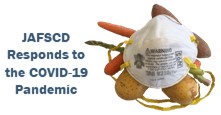COVID-19 and Food Security in Bangladesh
A Chance to Look Back at What Is Done and What Can Be Done
DOI:
https://doi.org/10.5304/jafscd.2020.094.008
Keywords:
COVID-19, Poverty, Food Security, Agriculture Extension Workers, Agricultural Marketplace, Food Relief, BangladeshAbstract
First paragraph:
The COVID-19 pandemic has created a global health crisis, and the long-term impact of the pandemic is predicted to reach far beyond today. In a lower-middle-income country with upward economic growth, such as Bangladesh, it is essential first to understand the present situation in order to create a proper recovery plan. Bangladesh has made significant progress in poverty reduction over the last two decades. Its poverty rate dropped to 23.2% in 2016 from 48.9% in 2000 (Bangladesh Bureau of Statistics [BBS], 2018), which has also helped improve the country’s food security status. Bangladesh has made remarkable progress over the last few years (Roy, Dev, & Sheheli, 2019) in most of the four dimensions of food security: food availability, food access, food utilization, and food stability. . . .
Metrics

Downloads
Published
How to Cite
Issue
Section
Categories
License
Copyright (c) 2020 The Authors

This work is licensed under a Creative Commons Attribution 4.0 International License.
The copyright to all content published in JAFSCD belongs to the author(s). It is licensed as CC BY 4.0. This license determines how you may reprint, copy, distribute, or otherwise share JAFSCD content.













